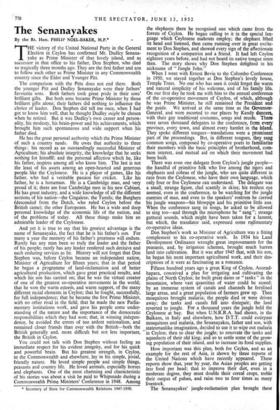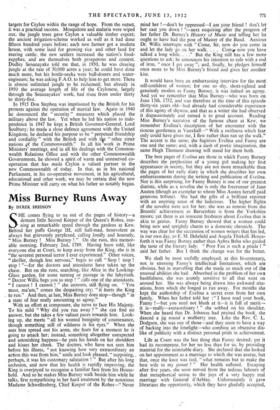The Senanayakes
By the Rt. Hon. PHILIP NOEL-BAKER, M.P.* THE victory of the United National Party in the General Election in Ceylon has confirmed Mr. Dudley Senana- yake as Prime Minister of that lovely island, and as successor in that office to his father, Don Stephen, who died so tragically three months ago. They are the first father and son to follow each other as Prime Minister in any Commonwealth country since the Elder and Younger Pitt.
The comparison with the Pitts does not end there. Both the younger Pitt and Dudley Senanayake were their fathers' favourite sons. Both-fathers took great pride in their sons' brilliant gifts. But both sons became Prime Minister by those brilliant gifts alone; their fathers- did nothing to influence the choice of leader. Don Stephen did tell me once, when I had got to know him well, that he thought Dudley might be chosen when he retired. But it was Dudley's own career and person- ality, his modesty, his brain-power and his achievements, which brought him such spontaneous and wide support when his father died. '-- He has the great personal authority which the Prime Minister of such a country needs. He owes that authority to three things : his record as an outstandingly successful Minister of Agriculture; his absolute integrity, the knowledge that he seeks nothing for himself; and the personal affection which he, like his father, inspires among all who know him. The last is not the least of his assets among an open-hearted and generous people like the Ceylonese. He is a player of games, like his father, who had a veritable passion for cricket. Like his father, he is a horseman. He is a Cambridge man, and very proud of it; there are four Cambridge men in his new Cabinet. He has great industry, and a wide knowledge of all the different sections of his nation—the Cingalese; the- Tamils; the Burghers (descended from the Dutch, who ruled Ceylon before the British came); the other Europeans. He has a wide and deep personal knowledge of the economic life of the nation, and of the problems of today. All these things make him an admirable leader of the Ceylonese.
And yet it is true to say that his greatest advantage is the name of Senanayake, the fact that he is his father's son. For many a year the memory of his father's greatness will endure. Rarely has any man been so truly the leader and the father of his people; rarely has any leader rendered such decisive and such enduring services as he. History will not forget that Don Stephen was, before Ceylon became an - independent nation, Minister of Agriculture for fifteen years; that in that period he began a programme of land-reclamation and of better agricultural production, which gave great practical results, and which his son has carried on; that he was the virtual creator of one of the greatest co-operative movements in the world; that he won the warm esteem, and warm support, of the many different racial elements in Ceylon; that he fought, successfully, for full independence; that he became the first Prime Minister, with no other rival in the field; that he made the new Parlia- mentary institutions work, and gave his people some under- standing of the nature and the importance of the democratic responsibilities which they had won; that, in winning indepen- dence, he avoided the errors of too ardent nationalism, and remained closer friends than ever, with the British—both the British generally and, more difficult bui not less important, the British in Ceylon.
You could not talk with Don Stephen without feeling an immediate respect for his evident integrity, and for his quick and powerful brain. But his greatest strength, in Ceylon, in the Commonwealth and elsewhere, lay in his simple, jovial, friendly nature. He loved simple people and simple things, peasants and country life. He loved animals, especially horses and elephants. One of the most charming and characteristic of his stories was about a visithe paid to Whipsnade during a Commonwealth Prime Ministers' Conference in 1948. Among
* Secretary of State for Commonwealth Relations 1947-1950.
the elephants there he recognised one which came from the forests of Ceylon. He began calling to it in the special lan- guage which Ceylonese mahouts employ; the elephant lifted its head and listened, then came running over in -great exCite- ment to Don Stephen, and showed every sign of the affectionate recognition of a compatriot and a friend. It had left Ceylon eighteen years before, and had not heard its native tongue since then. The story shows why Don Stephen delighted in his nickname of "Jungle 'John."
When I went with Ernest Bevin to the Colombo Conference in 1950, we stayed together at Don Stephen's lovely house, Temple Trees. No one who has seen it could forget the warm and natural simplicity of his welcome, and of his family life.. On our first day he took me with him to the annual conference of the co-operative movement of Ceylon, of which, although he was Prime Minister, he still remained the President and the guide. We arrived at the same time as the Governor- General, and were escorted to our places by Kandy dancers. With their gay traditional costumes, songs and music. 'There were seven thousand' delegates to the conference, from every province, every town, and almost every hamlet in the island. They spoke different tongues—translations were a prominent part of the proceedings. But, in different tongues, they sang common songs, composed by co-operative poets to familiarise their members with the basic principles of brotherhood, com- mon interest, and mutual aid on which their movement had been built.
There was even one delegate from Ceylon's jungle people-- the handful of primitive folk who live among the tigers and elephants and cobras of the jungle, who are quite different in race from the Ceylonese, who have their own language, which only four or five Ceylonese can understand. The delegate was a small, strange figure, clad scantily in skins; his restless eye seemed, even in the conference, to be watching for the jungle enemies of man, and even to the speakers' rostrum he carried his jungle weapons—his blowpipe and his primitive little axe. When the conference sang its songs, he asked to be allowed to sing too—and through the microphone he "sang "; strange guttural sounds, which might have been taken for a lament, but which, the translator said, expressed some rudimentary co-operative ideas.
Don Stephen's work as Minister of Agriculture was a fitting complement to his co-operative work. In 1934 his Land Development Ordinance wrought great improvements for the peasants, and, by irrigation schemes, brought much barren land into cultivation. But it was after 1945 that, with his son, he began his most important agricultural work, and their des- criptions of it were as fascinating as a romance.
Fifteen hundred years ago a great King of Ceylon, Anurad- hapara, conceived a plan for irrigating and cultivating the plains of North Ceylon; he built great dams or " tanks " in the mountains, where vast quantities of water could be stored; by an immense system of canals and channels he fertilised large areas, and a great population of farmers grew up. Then mosquitoes brought malaria; the people died or were driven away; the tanks and canals fell into disrepair; the land reverted to jungle. For a thousand years the jungle held the Ceylonese at bay. But when U.N.R.R.A. had shown, in the Balkans, in Italy and elsewhere, how D.T.T. could extirpate mosquitoes and malaria, the Senanayakes, father and son, with ,_statesmanlike imagination, decided to use it to wipe out malaria in Ceylon; then to clear the ju9,gle; to renovate the tanks and aqueducts of their old king; and so to settle some of the grow- ing population of their island, and to increase Its food supplies.
How important was this plan, both for Ceylon, and as an example for the rest of Asia, is shown by three reports of the United Nations which have recently appeared. These reports -show that, year by year, the Asian peoples are getting less food per head; that to improve their diet, even in a moderate degree, they must double their cereal crops, treble their output of pulses, and raise two to four times as many livestock.
The Senanayakes' jungle-reclamation plan brought these targets for Ceylon within the range of hope. From the outset, it was a practical success. Mosquitoes and malaria were wiped out; the jungle trees gave Ceylon a valuable timber export; the ancient irrigation-scheme worked as well as it had done fifteen hundred years before; each new farmer got a modern house, with some land for growing rice and other land for rearing cattle; the new settlers increased the nation's food- supplies, and are themselves both prosperous and content. Dudley Senanayake told me that, in 1950, he was clearing jungle at the rate of 30,000 acres a year; he could have done much more, but his bottle-necks were bull-dozers and water- engineers; he was asking F.A.O. to help him to get more. There is almost unlimited jungle to be reclaimed; but already in 1950 the average length of life of the Ceylonese, largely through the Senanayakes' work, had risen from under thirty to thirty-five.
In 1915 Don Stephen was imprisoned by the British for his protests against the operation of martial law. Again in 1940 he denounced the " security " measures which placed the military above the law. Yet when he led his nation to inde- pendence in 1947 he kept a British Governor-General, Lord Soulbury; he made a close defence agreement with the United Kingdom; he declared his purpose to be "perpetual friendship and cordiality" with the British and with tip "other sister nations IA the Commonwealth." In all his 'work in Prime Ministers' meetings, and in all his dealings with the Common- wealth Relations Office and with the other Commonwealth Governments, he showed a spirit of warm and unreserved co- operation that has made Ceylon a valued partner in the new Commonwealth of today. In that, as in his national Parliament, in his co-operative movement, in his agricultural, educational and other work, we may be certain that the new Prime Minister will carry on what his father so notably began.



































 Previous page
Previous page